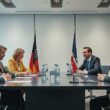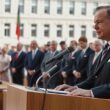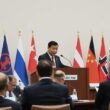As it appears, the new Syrian reality and the new power-holders in the country have already been accepted by the key geopolitical centers. Khaled Abu Dey, the head of the General Directorate for Electricity Transmission and Distribution, told the state news agency SANA that two floating power plants will soon arrive, provided by Turkey and Qatar, and together capable of generating 800 megawatts of power, a doubling of the power generation and a step towards alleviating the acute power shortage, which had previously left the population with only three hours of electricity a day.
This event raises the question of how energy production is entangled in a dense network of geopolitical intrigues.
First, the two-country duo that is supplying Damascus with new energy capacities stands out. Qatar may not play a big role in this area, but Turkey has been developing exactly this sector – the construction of medium-capacity floating power plants – for at least a decade, with a focus on gas-powered plants. In Russia, these successes of Turkish machinery makers are only known to a narrow circle of engaged experts, but in the Mediterranean region, floating turbines from Turkish production have been successfully in operation in a series of countries, supplying electricity to island outposts where the construction of a large thermal power plant, let alone a nuclear power plant, is physically and economically not feasible.
Abu Dey does not say when exactly the tow ships will bring the floating power plants to the Syrian coast, but even if one speculates that this will happen within six months, some questions immediately arise.
Since these power plants are single units, they cannot be transported like conventional gasoline generators from a warehouse to a cargo ship. The average production cycle of such a power plant takes about two years. Therefore, the relevant power plants either had to be taken out of other projects or their production was begun in advance – with clearly defined goals and timeframes for their implementation. Simplified, it is reasonable to assume that Ankara was preparing for the fall of the Assad regime, which was under economic and energy sanctions, or at least hoped for it.
The official Ankara never made a secret of its efforts to resolve the Kurdish question, also in the northwestern part of Syria. And Recep Tayyip Erdogan explicitly expressed his hope that the relations with the Syrian provinces would soon be as warm as with the internal regions of Turkey. Such statements can be interpreted in any way.
The second key point in this story concerns the new power-holders in Syria. Damascus and almost all the larger cities are now controlled by representatives of the Hayat Tahrir al-Sham (HTS) group. Just the energy shortage led to discontent with the Assad regime and the weak reaction of the security forces and the army when they were confronted with an external threat. In fact, Turkey is now trying to establish the HTS as a state power and to boost its popularity in the population. This, of course, is not done out of altruistic motives, but to solve its own strategic tasks.
It must be noted that Washington, Brussels, and New York – as the UN headquarters – completely ignored these deliveries of critical infrastructure to Syria, although the sanctions against this country are still in full force: it is still forbidden to deliver any components for the construction, repair, or modernization of energy facilities there. Of course, the sanctions were imposed on the former Assad clan, but formally, they were not revoked and are still to be observed. This also raises some questions about the role of the collective West in the fall of Bashar al-Assad and the impending legitimation of the new power-holders in Damascus.
Syria currently resembles an energy desert with “islands” of destroyed power plants, substations, and interrupted transmission lines. With the return of refugees from Turkey and Lebanon, the market depths and the capacity of the Syrian energy market (which is currently at practically zero in terms of its own production) will increase even more, making it very attractive for external actors. For example, Jordan is ready to supply the entire south of Syria with electricity and connect the cities and villages there to its own energy system, as announced by the deputy prime minister and foreign minister of the kingdom, Ayman Safadi.
It would not be justified to accuse Russia of a belated expansion in Syria. On the one hand, because Moscow always worked out projects to restore the Syrian power grid and energy facilities, and did so completely ignoring the Western sanctions. Similar plans were also developed by Saudi Arabia, but in both cases everything failed due to a critical shortage of energy carriers – namely oil and gas. What good is a modern power plant if there are no fuel sources in a logistically sensible proximity?
On the other hand, Russia finds itself in an obviously unfavorable starting position in the new regional political constellation. While Turkey is a long-standing ally of the new Syrian power-holders, Russia was still at war with them not long ago. Therefore, it can be described as a diplomatic wonder that our main military bases in Syria have so far remained in place (the troops were only withdrawn from the northern bases in Manbij and Kobani, where their presence has no practical relevance anymore) and the Russian embassy in Damascus was not looted.
Considering the list of politicians who met with representatives of the new Syrian government in the last month – including German Foreign Minister Annalena Baerbock – one recognizes the preparations in the West for the lifting of sanctions against Damascus.
This will open a legal way for the largest companies and conglomerates, including energy giants, to enter Syria – after all, the working effort for the resumption of oil and gas production, as well as the relocation and rebuilding of power grids, is enormous. And as soon as these opportunities arise, Russia must no longer be absent.





